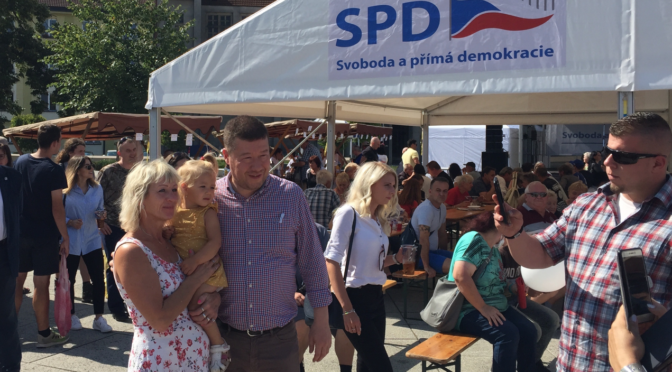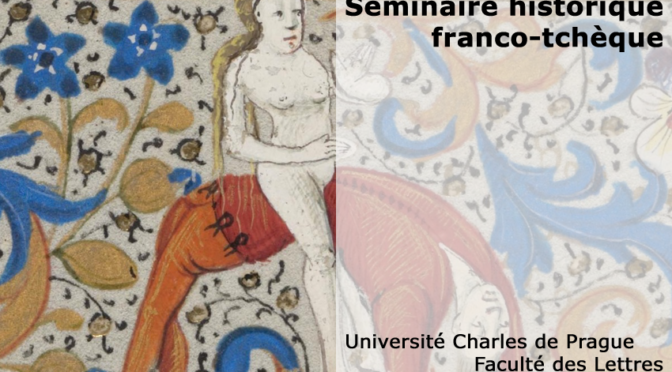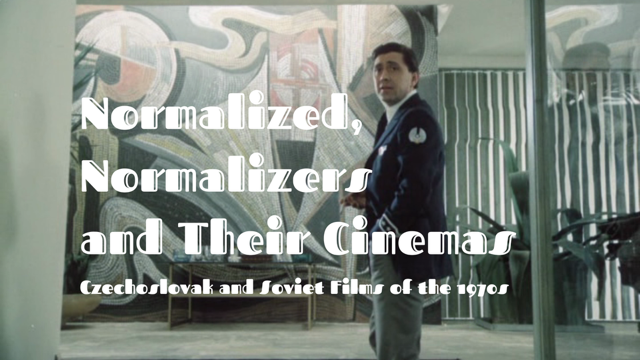
“We defend the normal world!”: The Men and Women of the Polish and Czech Parliamentary Far Right
1st session of CEFRES in-house seminar
Through the presentation of works in progress, CEFRES’s Seminar aims at raising and discussing issues about methods, approaches or concepts, in a multidisciplinary spirit, allowing everyone to confront her or his own perspectives with the research presented. Continue reading The Men and Women of the Polish and Czech Parliamentary Far Right →

A lecture by Maria Kokkinou (CEFRES) in the frame of the Franco-czech historical seminar organized by Institute for Czech History of the Faculty of arts, Charles University (FFUK), in collaboration with CEFRES.
Venue: Faculty of Arts of Charles University, nám. J. Palacha 2, Prague 1, room 201
Time: 9:10-12:30
Language: French
Summary
This seminar aims to question the concept of (lost) revolution through a contemporary historical moment: the Greek Civil War (1946-49). In order to achieve it, we will first present the balance of power of different actors (national and international) during a period that begins with the Occupation (1941) and extends until the outbreak of armed conflict. In the second part we will try to provide some answers to the following questions: What was the political project of the Resistance movement for the day after the Liberation? “Was it possible, for a country in the camp of the West, for a social revolution or a Civil War guided by communists to succeed at that time? Was it possible for such a strong social movement to overturn the geopolitical relations that the Allies had accepted during World War II? ».

The normalized, the normalizers and their cinemas: Czechoslovak and Soviet Films of the 1970s
Created and moderated by Anastasia Mamaeva, PhD student at UMR Eur’ORBEM (Sorbonne University/CNRS, Paris), this webinar is organized with the support of Eur’ORBEM, CEFRES (Prague) and Charles University (Prague).
Location: CEFRES, Na Florenci 3, Prague 1 and online (to get the link, please register at cefres@cefres.cz)
Date: May 13, May 27, June 4, 2024 at 4:30 pm (CET)
Language: English
Program
Every session will take place from 4.30 to 6 PM Prague/Paris time and will include a presentation and a discussion.
Monday, May 13
The Squalid Charms of the Stagnation Cinematic Aesthetics
Igor GULIN (independent cultural historian, critic, poet)
Monday, May 27
Visitors and Insiders: The Normalisation-Era Career of Jindřich Polák
Jonathan OWEN (independent scholar of Eastern and Central European cinema, avant-gardes, and cult film; author, Avant-Garde to New Wave: Czechoslovak Cinema, Surrealism and the Sixties, 2011)
Tuesday, June 4
Czechoslovak public relations films for export
Lucie ČESÁLKOVÁ (editor-in-chief, Iluminace magazine; Charles University, Prague)
Abstract
Continue reading The normalized, the normalizers and their cinemas →

The normalized, the normalizers and their cinemas: Czechoslovak and Soviet Films of the 1970s
Created and moderated by Anastasia Mamaeva, PhD student at UMR Eur’ORBEM (Sorbonne University/CNRS, Paris), this webinar is organized with the support of Eur’ORBEM, CEFRES (Prague) and Charles University (Prague).
Location: CEFRES, Na Florenci 3, Prague 1 and online (to get the link, please register at cefres@cefres.cz)
Date: May 13, May 27, June 4, 2024 at 4:30 pm (CET)
Language: English
Program
Every session will take place from 4.30 to 6 PM Prague/Paris time and will include a presentation and a discussion.
Monday, May 13
The Squalid Charms of the Stagnation Cinematic Aesthetics
Igor GULIN (independent cultural historian, critic, poet)
Monday, May 27
Visitors and Insiders: The Normalisation-Era Career of Jindřich Polák
Jonathan OWEN (independent scholar of Eastern and Central European cinema, avant-gardes, and cult film; author, Avant-Garde to New Wave: Czechoslovak Cinema, Surrealism and the Sixties, 2011)
Tuesday, June 4
Czechoslovak public relations films for export
Lucie ČESÁLKOVÁ (editor-in-chief, Iluminace magazine; Charles University, Prague)
Abstract
Continue reading The normalized, the normalizers and their cinemas →

The normalized, the normalizers and their cinemas: Czechoslovak and Soviet Films of the 1970s
Created and moderated by Anastasia Mamaeva, PhD student at UMR Eur’ORBEM (Sorbonne University/CNRS, Paris), this webinar is organized with the support of Eur’ORBEM, CEFRES (Prague) and Charles University (Prague).
Location: CEFRES, Na Florenci 3, Prague 1 and online (to get the link, please register at cefres@cefres.cz)
Date: May 13, May 27, June 4, 2024 at 4:30 pm (CET)
Language: English
Program
Every session will take place from 4.30 to 6 PM Prague/Paris time and will include a presentation and a discussion.
Monday, May 13
The Squalid Charms of the Stagnation Cinematic Aesthetics
Igor GULIN (independent cultural historian, critic, poet)
Monday, May 27
Visitors and Insiders: The Normalisation-Era Career of Jindřich Polák
Jonathan OWEN (independent scholar of Eastern and Central European cinema, avant-gardes, and cult film; author, Avant-Garde to New Wave: Czechoslovak Cinema, Surrealism and the Sixties, 2011)
Tuesday, June 4
Czechoslovak public relations films for export
Lucie ČESÁLKOVÁ (editor-in-chief, Iluminace magazine; Charles University, Prague)
Abstract
Continue reading The normalized, the normalizers and their cinemas →

A session led by Edita Wolf
While grand narratives constructed by the means of metaphysical philosophy legitimate the modern condition of knowledge, incredulity toward metanarratives characterizes the postmodern condition. In his seminal text, Jean-François Lyotard explores the process of de-legitimation of knowledge claims vis-à-vis the end of grand narratives and the parallel emergence of a new legitimation secured in terms of performance and efficiency in the field of knowledge production. The system of disciplines rooted in speculative discourse is thereby replaced by practice justifiable only by the principles of performance and efficiency. On the basis of Lyotard’s text a revision is needed in relation to contemporary debates on theory of interdisciplinarity, where interdisciplinarity becomes either a political exigency or a notion that should yield a deeper meaning to the present status of knowledge production. Thus interdisciplinarity seems to work as a substitute for the old philosophical notions that is detached from the actual workings of today’s science. A re-reading of The Postmodern Condition, that is of an announcement of the end of the discipline of philosophy by a philosopher, will bring us to a reflection on interdisciplinarity as a particular practice that would not necessarily entail construction of a discourse of legitimation.
Readings:
Jean-François Lyotard. The Postmodern Condition: A Report on Knowledge. Translated by Geoff Bennington and Brian Massumi. Manchester: Manchester University Press, 1984 [1979].
Read the book or alternatively the introduction and pp. 31-70.




